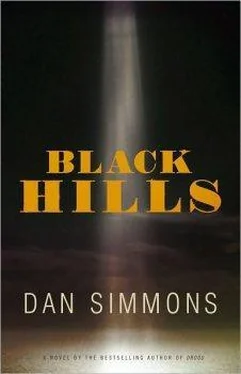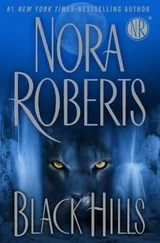For some days after his return, no one has time for or interest in Paha Sapa’s tale of counting coup and catching a ghost.
Paha Sapa was always sorry that there had been no time that morning after his meeting with Sitting Bull, Long Turd, and the other men to go up the hill and show them the corpse of the Wasicun whose ghost had entered him. That morning there was a pillar of dust visible to the north of where Major Reno and his surviving men were still pinned down on the hill three miles from where Paha Sapa had touched his dying Wasicun , and while the wasichus feared that it was still more Indians, the scouts serving Sitting Bull and Crazy Horse and the other chiefs knew that it was a large detachment of mounted bluecoats, almost certainly General Terry’s column coming from the same jumping-off point—the steamer Far West parked where the Yellowstone River meets the Rosebud—from whence Custer and his men had come.
Sitting Bull was too busy giving commands on breaking up the camp, leaving the honored dead in lodges, and arranging future rendezvous for the various groups of fighting men to go with Paha Sapa and Limps-a-Lot that morning, and when Paha Sapa led his tunkašila up that coulee in the sunrise, they saw the fresh wasichu troops on the northern horizon and quickly descended to their collapsed lodge and waiting ponies in the valley.
The huge village was broken down—except for those tipis and scaffolds left as lodges for the dead and tipi poles that some families simply had no time to carry with them, bringing only the tipi covers—within two hours, and by the time the wasichus descended into that valley in late afternoon, Sitting Bull had led all 8,000 or so Lakota and Cheyenne west toward the Big Horn Mountains and then divided the exodus into two columns, one heading to the southwest, the other—including Paha Sapa and Limps-a-Lot—to the southeast. From those main streams the bands and individuals broke off and scattered across the brown plains or toward the mountains.
In Paha Sapa’s village near the Slim Buttes, the nights were much as the first night at Greasy Grass had been: a strange combination of mourning and celebration, but since only two young men from Angry Badger’s band had died in the two big fights (the first fight with General Cook to the south, the second one with Custer), the late-into-the-night celebrations far outweighed the tremolo campfires and sunrise slashings of mourning.
By the early days of the new month, the Moon of Red Cherries, word arrives that while many of the warriors at the Greasy Grass are quietly returning with their families to the various agencies and reservations, Sitting Bull’s people and Crazy Horse’s warriors are still on the move, carrying on the fight. Some days after that, Lone Duck, a warrior from Angry Badger’s band (and another cousin of Three Buffalo Woman’s) who has ridden with Crazy Horse for three fighting seasons now, arrives to say that Sitting Bull and Crazy Horse have said their good-byes—the older chief’s last words to the younger fighting man were We will have good times! —and Sitting Bull will be leading his many families and relatively few young fighters to winter in Grandmother’s Country (the Grandmother being Queen Victoria) in the far north, while Crazy Horse, whose followers are almost all young fighting men, is roaming in the direction of Slim Buttes, killing wasichus whenever the opportunity arises.
But then word also arrives that the wasichus have been driven insane by the rubbing out of Long Hair and more than two hundred of his men. Soldiers are being marched everywhere. Warriors bring news that a band of Cheyenne has been attacked on the plains northwest of the Red Cloud Agency by elements of the Fifth Cavalry, who brag that they rode 85 miles in 31 hours to intercept the Cheyenne—who were not at Greasy Grass and who had nothing to do with Custer’s death.
Scouts passing through report that what is left of the Seventh Cavalry has mostly gone to ground at their base camp at the head of the Yellowstone, awaiting orders and drinking great amounts of whiskey (which is being sent upriver by various steamships). Lakota and Cheyenne and even some Crow, who have always been friends of Custer and his cavalry, report from agencies that they fear reprisals from the white men.
Three Stars, the General Cook whom Crazy Horse had soundly beaten on the Rosebud nine days before the death of Long Hair, and Long Hair’s commander General Terry are reportedly adding reinforcements to their fighting force and will soon be moving up the Rosebud Valley. What interests the Lakota scouts about this is that an old friend and enemy—a scout named Cody famous for shooting buffalo—has rejoined the army after many years to help Cook, Terry, and the others find the Lakota and Cheyenne and kill them.
All the men in camp agree that Cody is a worthy enemy and that his long, flowing hair—almost as luxuriant as Long Hair’s once was—would be a fine addition to any warrior’s tipi pole.
Despite his inability to sleep because of the ghost’s constant talking and babbling every night, Paha Sapa almost hopes that his ghost will be forgotten by others in all the excitement and fear and nightly celebrations and comings and goings of men from other bands.
But it has not been forgotten. The irony is that the very presence of these other bands and chiefs and holy men now brings attention to Paha Sapa and his ghost.

PAHA SAPA SEES and feels the confusion flowing over his small tiyospaye , lodge group, as these events dominate the Great Plains. The leader of their band, Angry Badger, rarely lives up to his name. The badger is considered the most ferocious creature on earth by the Lakota and its blood has magical properties. (Peering into a basin of it, for instance, will allow you to see yourself far in the future.) Badgers have been known to seize horses and drag them down into their badger holes while warriors can only look on in horror.
Angry Badger is a short, heavyset man of about fifty summers. His face is broad, flat, almost feminine, and his expression is set into a permanent scowl, but it is rarely one of unsupportable anger. He is given to melancholy and indecision and has never been chosen to be among the Deciders—those chiefs chosen each year to oversee the hunt of all the Oglala bands and to appoint the akicita tribal police—but he is cautious when he finally does decide and he has always relied upon the wisdom of the leading warriors and hunters in his small band, and especially the advice of Limps-a-Lot over the old and increasingly impotent Loud Voice Hawk.
Now Angry Badger is all but irrelevant as famous warriors and their bodyguards and fighting bands sweep into the Slim Buttes and south fork of the Grand River area where Angry Badger has led his men to hunt for buffalo before winter arrives.
Angry Badger was a courageous warrior in his youth—the band has composed songs commemorating his deeds—but he is a poor leader, and the freshness of his youthful glories have faded with each autumn since he last went on the war trail. Paha Sapa, not quite eleven summers old as they approach his birth month, is amazed by the names and faces and personalities that stop by their tiyospaye or camp nearby for short periods. (Decades later, reading Homer’s Iliad , Chapman’s translation, borrowed from Doane Robinson, Paha Sapa again feels sympathy for Angry Badger as he reads of Agamemnon’s jealousy in the presence of Achilles and other more-than-human heroes.
Among the famous fighters now within a few hours’ or days’ ride of their village is Crazy Horse himself—a charismatic warrior who now threatens to replace Sitting Bull as war leader, since the older chief is fleeing to Grandmother’s Country while Crazy Horse continues to harass and kill wasichus every day—as well as some of Crazy Horse’s feared and notorious friends and lieutenants, including Black Fox, Dog Goes, the intrepid Run Fearless, Kicking Bear, Bad Heart Bull, and Flying Hawk. Each of these men is a chief or leader of warriors in his own right and each now carries his own legends, as did Achilles with his Myrmidons. Along with Crazy Horse’s subalterns are groups of his akicita tribal-police bodyguards, each more fiercely painted and countenanced than the last, and these include the Oglalas Looking Horse, Short Bull, and Low Dog, as well as the odd Minneconjou Flying By, who is so eager to share in Crazy Horse’s growing glory that it is said that Flying By would ride east to try to capture the wasichus’ White Father if Crazy Horse ordered him to.
Читать дальше













